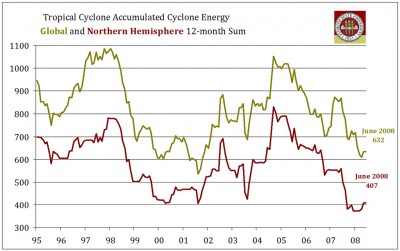Hurricanes offer a difficult data set to work with. Since there are so few, even small numerical changes year over year can lead to substantial percentage changes. Also, random variations in landfall can change at least media perceptions of hurricane frequency. That is why I have argued for a while that metrics like total cyclonic energy are better for looking at hurricane trends. And, as you can see below, there has been no positive trend over the last 15 years or so:
The Australian National Climate Center confirmed these findings:
Concern about the enhanced greenhouse effect affecting TC frequency
and intensity has grown over recent decades. Recently, trends in global
TC activity for the period 1970 to 2004 have been examined by Webster
et al. [2005]. They concluded that no global trend has yet emerged in the total number of tropical storms and hurricanes."… For the 1981/82 to 2005/06 TC seasons, there are no apparent trends in the total numbers and cyclone days of TCs, nor in numbers and cyclone days of severe TCs with minimum central pressure of 970 hPa or lower.


It comes as no surprise that when I check this out, I find you’ve quoted a couple of lines directly from the abstract, but not this one:
However, significant positive trends in occurrences and cyclone days of severe TCs with minimum central pressure of 945 hPa or lower have been identified.
The fact remains:
“..They concluded that no global trend has yet emerged in the total number of tropical storms and hurricanes.”… For the 1981/82 to 2005/06 TC seasons, there are no apparent trends in the total numbers and cyclone days of TCs, nor in numbers and cyclone days of severe TCs with minimum central pressure of 970 hPa or lower.”
LOL
However, significant positive trends in occurrences and cyclone days of severe TCs with minimum central pressure of 945 hPa or lower have been identified.
Do you understand that it’s dishonest to selectively quote results?
The fact remains:
“..They concluded that no global trend has yet emerged in the total number of tropical storms and hurricanes.”… For the 1981/82 to 2005/06 TC seasons, there are no apparent trends in the total numbers and cyclone days of TCs, nor in numbers and cyclone days of severe TCs with minimum central pressure of 970 hPa or lower.”
Who stated this?
Are you a complete fucking retard? Are you so fucking stupid that all you can do is bleat the bit of the paper that you like? Are you so mentally backward that you can’t understand what the problem is with selectively quoting results? You fucking idiot.
Scientist you actually want to lecture us about honesty?
Sir John Houghton chairman IPCC 1995
“Unless we announce disasters, no one will listen.”
Al Gore
“I believe it is appropriate to have an over-representation of factual presentations on how dangerous it is”
Steven Schneider
“We have to offer up scary scenarios, make simplified, dramatic statements, and make little mention of any doubts we have. Each of us has to decide what the right balance is between being effective and being honest.”
I recommend to watch Apocalypse? NO!
“Are you a complete fucking retard? Are you so fucking stupid that all you can do is bleat the bit of the paper that you like? Are you so mentally backward that you can’t understand what the problem is with selectively quoting results? You fucking idiot.”
You did that and not once did I ever dispute it.In fact I did not dispute what you wrote at all.
Now who is the idiot?
LOL
By deduction Southern Hemisphere ACE looks remarkably steady.
Given it’s apparent evenness would any indication of global warming show up better there then in the Northern hemisphere?
In the timeframe displayed we’ve seen measured CO2 increasing steadily and an entire solar cycle but little change in accumulated energy in the Southern hemisphere. As I understand the simple GW theory, more CO2 = more solar energy absorbed. Should this be evident in an increase in ACE?
At the same time there doesn’t appear to be any fingerprint of the solar cycle as a driver of ACE. I don’t think the Northern hemisphere data tallies particularly well with the solar cycles and the Southern hemisphere shows no change over a considerable period of time.